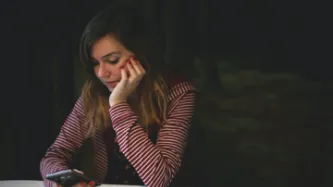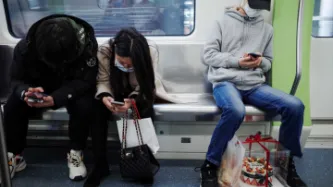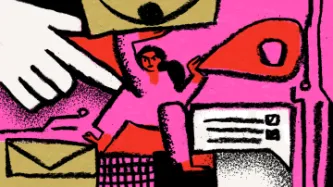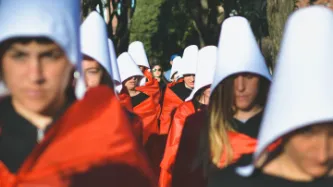Advanced Search
Content Type: Case Study
Over the past decade targeted advertisement has become exponentially more invasive. To enable targeted advertisement, massive amounts of data about individuals are collected, shared and processed often without their knowledge or consent. This information about us is then used to profile us and micro-target us to sell us products or influence our views.
This is a significant intrusion to our privacy inevitably affects our perogative not to reveal our thoughts; not to have our thoughts…
Content Type: Video
PI's Reproductive Rights and Privacy Project speaks with Nandini Archer from the 50/50 Project at Open Democracy about how Heartbeat International is coordinating and promoting misleading health information globally information through it’s international affiliates.
More here: https://privacyinternational.org/taxonomy/term/677
Content Type: Long Read
‘Let’s build an app for that’ has become the response to so many things. It’s no surprise it’s happening now.
Apps are notorious for their lack of security and privacy safeguards, exploiting people’s data and devices. Now we’re being asked to trust governments with their proposed apps -- of which there are many. These are the very same governments who have been keen to exploit data in the past. For instance, PI currently has four outstanding legal cases arising from the last times governments…
Content Type: Examples
A BBC article captures the story of a student living in Taiwan under quarantine, who reports that when his battery on his phone ran out, within an hour four different local administrative units contacted him; and a patrol was dispatched to verify his location; and a text was sent that the government had lost track of him and warned him of potential arrest for breaking quarantine.
According to the BBC report, Taiwan uses mobile signals to triangulate location of people under quarantine (…
Content Type: Video
PI's Reproductive Rights and Privacy Project speaks with Dr. Subasri Narasimhan and Dr. Dabney Evans from the Rollins School of Public Health at Emory University in the US about their paper which documents how misleading health information about reproductive health can flow into policy and legislative debates.
More here: https://privacyinternational.org/taxonomy/term/677
A narrative analysis of anti-abortion testimony and legislative debate related to Georgia’s fetal “heartbeat”…
Content Type: Video
PI's Reproductive Rights and Privacy Project speaks with Ruth Taylor, the CEO of the UK-based charity Abortion Support Network about how opposition groups are using misinformation to delay people from accessing safe abortion care.
More here: https://privacyinternational.org/taxonomy/term/677
Content Type: Video
PI's Reproductive Rights and Privacy Project speaks with Tasneem Mewa and Ambika Tandon from the Center for Internet and Society about data exploitation in reproductive rights in India.
This podcast is part of a special series from PI's Reproductive Rights and Privacy Project.
The series comes out on the last Monday of every month.
You can listen and subscribe to the podcast where ever you normally find your podcasts:
Spotify
Apple podcasts
Google podcasts
Castbox
Overcast
Pocket…
Content Type: Long Read
On 15th April Margaret Atwood, author of the Handmaid's Tale, gave an interview to BBC Radio 5 Live where she commented that ‘people may be making arrangements that aren’t too pleasant, but it’s not a deliberate totalitarianism’. You can read more about the interview in the Guardian.
While we agree with Margaret Atwood that we are not necessarily entering an era of "deliberate totalitarianism" we have written the following open letter (download link at the bottom of the page) to her as a ‘…
Content Type: Examples
Oura Rings, which measure body temperature and blood pulse volume to determine heart and respiratory rate and track sleep, are the subject of a national study being jointly conducted by the West Virginia University Rockefeller Neuroscience Institute, WVU Medicine, and Oura Health in hopes it can be used to predict infection and identify infected health workers before they become symptomatic. The rings and their accompanying smartphone app have been issued to physicians, nurses, and other…
Content Type: Examples
The Department of Health in the US state of Kansas is tracking residents' locations via a platform called Unacast, which compares aggregated GPS mobile phone data from before and after the implementation of social distancing and grades each county on its compliance. As of April 1, 45 of 105 Kansas counties had received an F rating, and the state as a whole had managed a C. Unacast says the data it has access to is updated every other day and publishes updated ratings on all 50 US states.…
Content Type: Examples
The city of Moscow is planning to use smartphone geolocation functions to track foreign tourists' movements through the city to prevent outbreaks of COVID-19 after Russia reopens its borders. Moscow accounts for two-thirds of all cases in the country. Moscow City Hall is considering a system that would provide daily updates on tourists' movements using their SIM card data and show when residents come into contact with them; it is already buying location data from Russia's three biggest telecom…
Content Type: Examples
On April 2 Peruvian president Martín Vizcarra issued a controversial rule that men and women must observe quarantine on different days: men may leave their homes on Mondays, Wednesdays, and Fridays, while women may leave only on Tuesdays, Thursdays, and Saturdays. No one is allowed out on Sundays. Some critics are concerned that the plan will lead to disproportionate harassment of LGBTQ+ people because the police are instructed to stop people based on gender presentation. The purpose, the…
Content Type: Examples
An Excel file containing complete data pertaining to patients tested for coronavirus in the cities Quetta and Taftan in the the Balochistan region of Pakistan has been circulating in WhatsApp groups about Balochistan. The file contains information such as names, phone numbers, age address and other identifying information for the patients. The leaked data puts the patients at risk of personal harm and social stigma, even after recovery. Balochistan government officials say the data leaked…
Content Type: Examples
The Norwegian contact tracing app, Infection Stop, relies on a centralised database to store users' GPS locations for 30 days, like its Chinese counterpart. Sumula, the company that developed the app, claims is necessary because of technical limitations in Apple's smartphone operating system iOS. Simula has rejected using Bluetooth, like Singapore's TraceTogether, because to work on Apple's iPhones the tracker app would have to be in the forefront in order to be able to use Bluetooth to send,…
Content Type: Examples
In order to enforce mandatory 14-day quarantine orders, Kenyan authorities have been tracking mobile phones of people suspected to have COVID-19. Also in Kenya, police enforcement efforts have led to several deaths: three died of injuries from being beaten, one, a 13-year-old boy, was hit by a bullet.
Source: https://www.bbc.co.uk/news/world-africa-52214740
Writer: Dickens Olewe
Publication: BBC News
Content Type: Examples
The Kazakhstani ministry of health requires the 8,000 or so Kazakhstani citizens currently under quarantine to use the SmartAstana tracking app, which enables officials to ensure that they remain in isolation. By contrast, for the city of Almaty the ministry of the interior relies on video surveillance technology called Sergek, produced by the local telecommunications firm Korkem Telecom to find people who break quarantine . So far, these two cases are the only examples of the government…
Content Type: Examples
The Guatemalan government is using the app Alerta Guate to spread public health information, which was created by the Chicago-registered company In-telligent LLC. The app is allowed to collect each user's email address, social media account handles, age, personal interests, and geographic location, and asks permission to access files, calls, and audio, among others. The president has said he wants to ensure that citizens keep the app installed so it can be used later for other purposes such as…
Content Type: Examples
Germany's federal agency responsible for disease control and prevention, the Robert Koch Institute, has teamed up with the health technology start-up Thryve to develop an app called Corona-Datenspende ("data donation") that works with a variety of smartwatches and fitness wristbands. The app is designed to use the device's sensors to collect user data, and includes algorithms to it to spot symptoms linked to COVID-19 and help predict the spread and containment of the virus. More than 50,000…
Content Type: Examples
Anyone in Egypt who suspects they or others have COVID-19 is required to immediately report it to the authorities in order to stop the spread of the virus and enable treatment. On April 1 Ahmed Refaat, a member of the parliamentary Telecommunications Committee, submitted a proposal for creating an app that would track these cases and allow them to receive a test result without having to return to the testing centre. The proposed app would also provide daily updates on the virus's spread and the…
Content Type: Examples
The Guangzhou Public Transportation Group has installed a biometric tablet next to bus drivers' seats so they can check the temperature and identity of every passenger who boards. The tablets will also photograph each passenger, allowing them to be identified by China's facial recognition network in the hope of helping control the spread of the novel coronavirus by enabling contact tracing for anyone displaying symptoms. The Group claims the data so gathered will only be used in the interests…
Content Type: Examples
As part of its new state of emergency law, Cambodia's national assembly has granted the country's leader, Hun Sen, new powers to surveille telecommunications, control the press and social media, restrict freedom of movement and of assembly, seize private property, and enforce quarantine orders, as well as enact other measures "deemed appropriate and necessary". Amnesty International called the legislation indefensible and a concentration of unchecked power.
Source: https://www.…
Content Type: Examples
The Bangladeshi start-up Sigmind.ai has developed the WATCHCAM Mass Surveillance System, which it claims can recognise individuals even when they're wearing a mask with 87.3% accuracy - and 99.4% if they're not wearing a mask. The company began developing the system in 2019 to provide ATM security, but it now marketing it for contact tracing, help track down infected people, and enforce quarantine.
Source: https://www.dhakatribune.com/bangladesh/2020/04/07/bangladeshi-developers-devise-a…
Content Type: Examples
On request, Vodafone Australia, which has 6 million subscribers nationwide, handed the mobile phone location data of several million Australians to the federal and New South Wales governments to help them monitor whether people are following the social distancing restrictions. The governments, medical experts, and media had previously used the data collected by transport apps such as CityMapper, but the number who use that one app is necessarily limited. Vodafone claimed the data was anonymised…
Content Type: Examples
The Afghan Ministry of Public Health and Ministry of Telecommunications and Information Technology have launched the "corona.asan.gov.af" software to provide health advice in three English, Dari, and Pashto; using the questions embedded in the software users can evaluate themselves for the virus.
Source: https://tolonews.com/afghanistan/afghan-ministries-launch-coronavirus-tracking-app
Writer: TOLOnews
Publication: TOLOnews
Content Type: Examples
Google has begun publishing "COVID-19 Community Mobility Reports", which analyse the location data it collects from smartphones to create maps of aggregated changes in the movement of populations around the world. Google claims the data is "anonymised" via differential privacy, and suggests that governments can use the results of its analysis to understand not only whether people are travelling but where, so they can adapt transport policies to ensure adequate distancing. It is unclear how…
Content Type: Advocacy
To the Members of the European Parliament and to the Committee on Budgets of the European Parliament
The EU urgently needs to step up and provide assistance to protect the health and safety of people trapped in camps on the Greek islands - not just to protect their welfare, but to contain the virus itself as a matter of global public health.
However, as we detail in the briefing below, the current European Commission proposal for funds allocation is insufficient to ensure the safety of…
Content Type: Examples
Apple and Google have announced a partnership to enable governments and health agencies to use Bluetooth for proximity-based contact tracing to help reduce the spread of the novel coronavirus while preserving user privacy and security. The effort is due to begin with the May release of APIs that will enable Android and iOS devices using apps from public health authorities to interoperate. The two companies will go on to build Bluetooth-based contact tracing into their underlying platforms. The…
Content Type: Case Study
Since August 2017 742,000 Rohingya people - including children - fled across the Myanmar border to Bangladesh, escaping what the UN labelled a “textbook example of ethnic cleansing”.
In this context of ethnoreligious violence, Facebook has been a central figure. For many in Myanmar “Facebook is the internet” - as of January 2018 around 19 million people in Myanmar were facebook users, this is roughly equal to the number of internet users in the country.
A New York Times report revealed that…
Content Type: Examples
The government has issued a substantial rewrite of a controversial proposal to track people using their phones and other devices in the bid to contain Covid-19. AmaBhungane, an investigative journalism newsroom, said the first “directions” – issued last week by the minister of communications – raised "serious concerns for their vagueness and lack of privacy protections”. The new regulations provide more judicial oversight, restrict the purpose to contact tracing, and aim to ensure that…
Content Type: Examples
GDPRHub is collecting a list of projects around the world that are using personal data to combat the novel coronavirus. The list is divided into categories such as decentralised contact tracing apps and frameworks; centralised contact tracing systems; lockdown enforcement; self-assessment apps; mapping projects; and statistical analysis. The site also tracks COVID-19-releated data protection issues.
Source: https://gdprhub.eu/index.php?title=Projects_using_personal_data_to_combat_SARS-…





